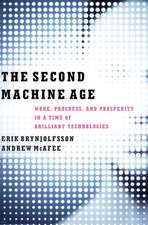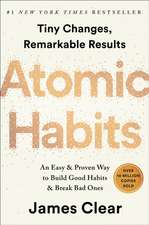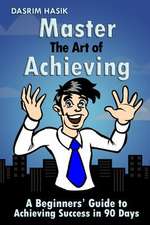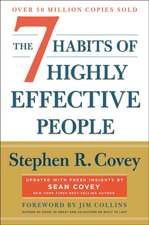Emotional Intelligence: Why It Can Matter More Than IQ
Autor Daniel P. Golemanen Limba Engleză Paperback – 31 aug 2005
"A thoughtfully written, persuasive account explaining emotional intelligence and why it can be crucial."-USA Today
Everyone knows that high IQ is no guarantee of success, happiness, or virtue, but until Emotional Intelligence, we could only guess why. Daniel Goleman's brilliant report from the frontiers of psychology and neuroscience offers startling new insight into our "two minds"-the rational and the emotional-and how they together shape our destiny.
Drawing on groundbreaking brain and behavioral research, Goleman shows the factors at work when people of high IQ flounder and those of modest IQ do surprisingly well. These factors, which include self-awareness, self-discipline, and empathy, add up to a different way of being smart-and they aren't fixed at birth. Although shaped by childhood experiences, emotional intelligence can be nurtured and strengthened throughout our adulthood-with immediate benefits to our health, our relationships, and our work.
With new information reflecting the latest research, this tenth anniversary edition offers a significant updating of the EI model and answers questions posed to Goleman during his worldwide speaking appearances. A new section also guides readers to the best resources in the fast-growing field of EI studies.
| Toate formatele și edițiile | Preț | Express |
|---|---|---|
| Paperback (1) | 108.47 lei 22-36 zile | +18.24 lei 5-11 zile |
| Bantam Books – 31 aug 2005 | 108.47 lei 22-36 zile | +18.24 lei 5-11 zile |
| Hardback (1) | 182.58 lei 22-36 zile | |
| Bantam Books – 31 aug 2006 | 182.58 lei 22-36 zile |
Preț: 108.47 lei
Nou
20.76€ • 21.54$ • 17.35£
Carte disponibilă
Livrare economică 24 februarie-10 martie
Livrare express 07-13 februarie pentru 28.23 lei
Specificații
ISBN-10: 055338371X
Pagini: 358
Dimensiuni: 134 x 210 x 21 mm
Greutate: 0.3 kg
Ediția:Anniversary
Editura: Bantam Books
Recenzii
"Good news to the employee looking for advancement [and] a wake-up call to organizations and corporations."—The Christian Science Monitor
"Anyone interested in leadership...should get a copy of this book. In fact, I recommend it to all readers anywhere who want to see their organizations in the phone book in the year 2001."—Warren Bennis, The New York Times Book Review
"A thoughtfully written, persuasive account explaining emotional intelligence and why it can be crucial to your career." —USA Today
From the Hardcover edition.
Notă biografică
Extras
The rules for work are changing. We're being judged by a new yardstick: not just by how smart we are, or by our training and expertise, but also by how well we handle ourselves and each other. This yardstick is increasingly applied in choosing who will be hired and who will not, who will be let go and who retained, who passed over and who promoted.
The new rules predict who is most likely to become a star performer and who is most prone to derailing. And, no matter what field we work in currently, they measure the traits that are crucial to our marketability for future jobs.
These rules have little to do with what we were told was important in school; academic abilities are largely irrelevant to this standard. The new measure takes for granted having enough intellectual ability and technical know-how to do our jobs; it focuses instead on personal qualities, such as initiative and empathy, adaptability and persuasiveness.
This is no passing fad, nor just the management nostrum of the moment. The data that argue for taking it seriously are based on studies of tens of thousands of working people, in callings of every kind. The research distills with unprecedented precision which qualities mark a star performer. And it demonstrates which human abilities make up the greater part of the ingredients for excellence at work—most especially for leadership.
If you work in a large organization, even now you are probably being evaluated in terms of these capabilities, though you may not know it. If you are applying for a job, you are likely to be scrutinized through this lens, though, again, no one will tell you so explicitly. Whatever your job, understanding how to cultivate these capabilities can be essential for success in your career.
If you are part of a management team, you need to consider whether your organization fosters these competencies or discourages them. To the degree your organizational climate nourishes these competencies, your organization will be more effective and productive. You will maximize your group's intelligence, the synergistic interaction of every person's best talents.
If you work for a small organization or for yourself, your ability to perform at peak depends to a very great extent on your having these abilities—though almost certainly you were never taught them in school. Even so, your career will depend, to a greater or lesser extent, on how well you have mastered these capacities.
In a time with no guarantees of job security, when the very concept of a "job" is rapidly being replaced by "portable skills," these are prime qualities that make and keep us employable. Talked about loosely for decades under a variety of names, from "character" and "personality" to "soft skills" and "competence," there is at last a more precise understanding of these human talents, and a new name for them: emotional intelligence.
A Different Way of Being Smart
"I had the lowest cumulative grade point average ever in my engineering school," the codirector of a consulting firm tells me. "But when I joined the army and went to officer candidate school, I was number one in my class—it was all about how you handle yourself, get along with people, work in teams, leadership. And that's what I find to be true in the world of work."
In other words, what matters is a different way of being smart. In my book Emotional Intelligence, my focus was primarily on education, though a short chapter dealt with implications for work and organizational life.
What caught me by utter surprise—and delighted me—was the flood of interest from the business community. Responding to a tidal wave of letters and faxes, e-mails and phone calls, requests to speak and consult, I found myself on a global odyssey, talking to thousands of people, from CEOs to secretaries, about what it means to bring emotional intelligence to work.
* * *
This search has taken me back to research I participated in while a graduate student, and then faculty member, at Harvard University. That research was part of an early challenge to the IQ mystique—the false but widely embraced notion that what matters for success is intellect alone. This work helped spawn what has now become a mini-industry that analyzes the actual competencies that make people successful in jobs and organizations of every kind, and the findings are astonishing: IQ takes second position to emotional intelligence in determining outstanding job performance.
Analyses done by dozens of different experts in close to five hundred corporations, government agencies, and nonprofit organizations worldwide have arrived independently at remarkably similar conclusions, and their findings are particularly compelling because they avoid the biases or limits inherent in the work of a single individual or group. Their conclusions all point to the paramount place of emotional intelligence in excellence on the job--in virtually any job.
Some Misconceptions
As I've toured the world talking and consulting with people in business, I've encountered certain widespread misunderstandings about emotional intelligence. Let me clear up some of the most common at the outset. First, emotional intelligence does not mean merely "being nice." At strategic moments it may demand not "being nice," but rather, for example, bluntly confronting someone with an uncomfortable but consequential truth they've been avoiding.
Second, emotional intelligence does not mean giving free rein to feelings—"letting it all hang out." Rather, it means managing feelings so that they are expressed appropriately and effectively, enabling people to work together smoothly toward their common goals.
Also, women are not "smarter" than men when it comes to emotional intelligence, nor are men superior to women. Each of us has a personal profile of strengths and weaknesses in these capacities. Some of us may be highly empathic but lack some abilities to handle our own distress; others may be quite aware of the subtlest shift in our own moods, yet be inept socially.
It is true that men and women as groups tend to have a shared, gender-specific profile of strong and weak points. An analysis of emotional intelligence in thousands of men and women found that women, on average, are more aware of their emotions, show more empathy, and are more adept interpersonally. Men, on the other hand, are more self-confident and optimistic, adapt more easily, and handle stress better.
In general, however, there are far more similarities than differences. Some men are as empathic as the most interpersonally sensitive women, while some women are every bit as able to withstand stress as the most emotionally resilient men. Indeed, on average, looking at the overall ratings for men and women, the strengths and weaknesses average out, so that in terms of total emotional intelligence, there are no sex differences.
Finally, our level of emotional intelligence is not fixed genetically, nor does it develop only in early childhood. Unlike IQ, which changes little after our teen years, emotional intelligence seems to be largely learned, and it continues to develop as we go through life and learn from our experiences—our competence in it can keep growing. In fact, studies that have tracked people's level of emotional intelligence through the years show that people get better and better in these capabilities as they grow more adept at handling their own emotions and impulses, at motivating themselves, and at honing their empathy and social adroitness. There is an old-fashioned word for this growth in emotional intelligence: maturity.
Why This Matters Now
At a California biotech start-up, the CEO proudly enumerated the features that made his organization state-of-the-art: No one, including him, had a fixed office; instead, everyone carried a small laptop—their mobile office—and was wired to everyone else. Job titles were irrelevant; employees worked in cross-functional teams and the place bubbled with creative energy. People routinely put in seventy- and eighty-hour work weeks.
"So what's the downside?" I asked him.
"There is no downside," he assured me.
And that was the fallacy. Once I was free to talk with staff members, I heard the truth: The hectic pace had people feeling burned out and robbed of their private lives. And though everyone could talk via computer to everyone else, people felt that no one was truly listening to them.
People desperately felt the need for connection, for empathy, for open communication.
In the new, stripped-down, every-job-counts business climate, these human realities will matter more than ever. Massive change is a constant; technical innovations, global competition, and the pressures of institutional investors are ever-escalating forces for flux.
Another reality makes emotional intelligence ever more crucial: As organizations shrink through waves of downsizing, those people who remain are more accountable—and more visible. Where earlier a midlevel employee might easily hide a hot temper or shyness, now competencies such as managing one's emotions, handling encounters well, teamwork, and leadership, show—and count--more than ever.
The globalization of the workforce puts a particular premium on emotional intelligence in wealthier countries. Higher wages in these countries, if they are to be maintained, will depend on a new kind of productivity. And structural fixes or technological advances alone are not enough: As at the California biotech firm, streamlining or other innovations often create new problems that cry out for even greater emotional intelligence.
As business changes, so do the traits needed to excel. Data tracking the talents of star performers over several decades reveal that two abilities that mattered relatively little for success in the 1970s have become crucially important in the 1990s: team building and adapting to change. And entirely new capabilities have begun to appear as traits of star performers, notably change catalyst and leveraging diversity. New challenges demand new talents.
A Coming Crisis: Rising IQ, Dropping EQ
Since 1918, when World War I brought the first mass use of IQ tests on American army recruits, the average IQ score in the United States has risen 24 points, and there has been a similar rise in developed countries around the world. The reasons include better nutrition, more children completing more schooling, computer games and puzzles that help children master spatial skills, and smaller family size (which generally correlates with higher IQ scores in children).
There is a dangerous paradox at work, however: As children grow ever smarter in IQ, their emotional intelligence is on the decline. Perhaps the most disturbing single piece of data comes from a massive survey of parents and teachers that shows the present generation of children to be more emotionally troubled than the last. On average, children are growing more lonely and depressed, more angry and unruly, more nervous and prone to worry, more impulsive and aggressive.
Two random samples of American children, age seven to sixteen, were evaluated by their parents and teachers—adults who knew them well. The first group was assessed in the mid-1970s, and a comparable group was surveyed in the late 1980s. Over that decade and a half there was a steady worsening of children's emotional intelligence. Although poorer children started out at a lower level on average, the rate of decline was the same across all economic groups—as steep in the wealthiest suburbs as in the poorest inner-city slum.
Dr. Thomas Achenbach, the University of Vermont psychologist who did these studies—and who has collaborated with colleagues on similar assessments in other nations—tells me that the decline in children's basic emotional competencies seems to be worldwide. The most telling signs of this are seen in rising rates among young people of problems such as despair, alienation, drug abuse, crime and violence, depression or eating disorders, unwanted pregnancies, bullying, and dropping out of school.
What this portends for the workplace is quite troubling: growing deficiencies among workers in emotional intelligence, particularly among those newest to the job. Most of the children that Achenbach studied in the late 1980s will be in their twenties by the year 2000. The generation that is falling behind in emotional intelligence is entering the workforce today.
Descriere
INTERNATIONAL BESTSELLER • Is IQ destiny? Not nearly as much as we think.
"A thoughtfully written, persuasive account explaining emotional intelligence and why it can be crucial."-USA Today
Everyone knows that high IQ is no guarantee of success, happiness, or virtue, but until Emotional Intelligence, we could only guess why. Daniel Goleman's brilliant report from the frontiers of psychology and neuroscience offers startling new insight into our "two minds"-the rational and the emotional-and how they together shape our destiny.
Drawing on groundbreaking brain and behavioral research, Goleman shows the factors at work when people of high IQ flounder and those of modest IQ do surprisingly well. These factors, which include self-awareness, self-discipline, and empathy, add up to a different way of being smart-and they aren't fixed at birth. Although shaped by childhood experiences, emotional intelligence can be nurtured and strengthened throughout our adulthood-with immediate benefits to our health, our relationships, and our work.
With new information reflecting the latest research, this tenth anniversary edition offers a significant updating of the EI model and answers questions posed to Goleman during his worldwide speaking appearances. A new section also guides readers to the best resources in the fast-growing field of EI studies.



















